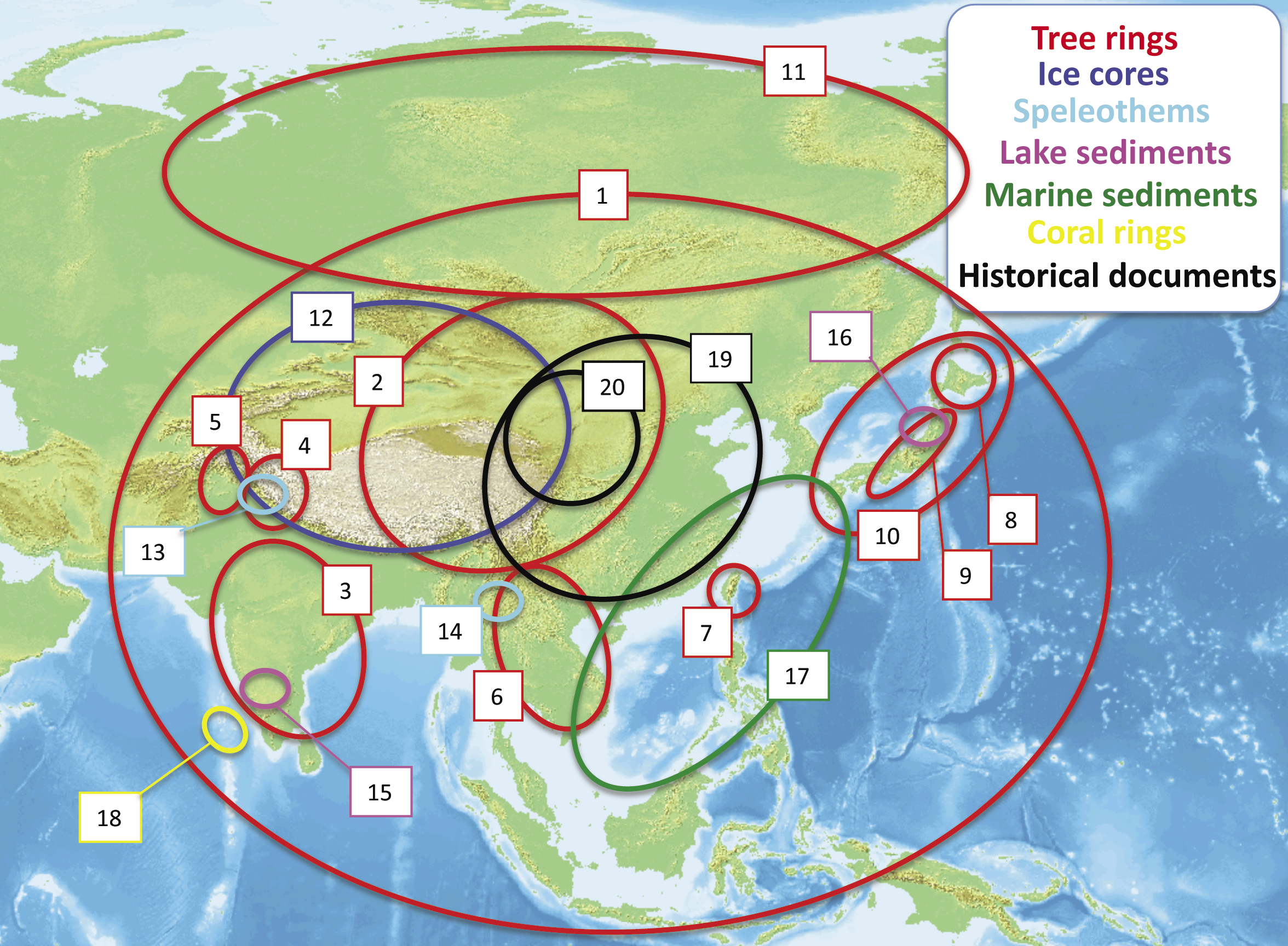- Home
- Publications
- PAGES Magazine
- The First Asia2k Regional Workshop
The first Asia2k regional workshop
Takeshi Nakatsuka and Masaki Sano
Past Global Changes Magazine
19(1)
38
2011
Takeshi Nakatsuka and Masaki Sano
Graduate School of Environmental Studies, Nagoya University, Japan; nakatsuka.takeshi f.mbox.nagoya-u.ac.jp
f.mbox.nagoya-u.ac.jp
Nagoya, Japan, 26-27 August 2010
Asia is an important region in the PAGES 2k Network for the reconstruction of climate of the last 2000 years. Around 60% of people in the world live in Asia and major climate phenomena, such as large-scale monsoon systems, affect their livelihood regionally and the climate system globally. However, paleoclimate data of last two millennia have not been integrated well in Asia until now.
For the reconstruction of paleoclimate with annual or sub-annual time resolution, tree rings are one of the most advantageous climate archives. Many long tree-ring chronologies have been established in cold and dry Asia such as the Tibetan plateau and Gobi desert. Unlike most higher latitude regions, tree-ring studies in tropical and subtropical Asia are constrained by the additional challenge of harboring only few tree species that form annual rings. However, dendrochronologists have recently managed to overcome this limitation by systematically searching for ring-forming and climate-sensitive tree species, and have successfully developed the first tree-ring based reconstructions of past precipitation and temperature in humid and temperate Asia, including Indochina, Taiwan, and Japan.
Furthermore, historical documents, especially from China, provide exceptionally long records of past climate with a seasonal resolution that can reach back to more than two millennia. Lake and marine sediment studies have also resulted in important data sets of high-resolution climate variations in Asia. A growing number of speleothems records from China and many other countries reflect past hydroclimate on various time scales. Ice cores from the mountains and corals from coastal regions provide further unique data sets on climate dynamics from land and ocean.
The first Asia 2k Regional Workshop was designed to review the state of paleoclimate science in Asia towards the synthesis of various kinds of proxy-based Asian climate reconstructions during last two millennia.
A total of 73 scientists and students, including the 15 invited international scientists, attended this workshop with 24 oral and 26 poster presentations. Oral sessions consisted of keynotes by members of the scientific committee (E. Cook, H. Borgaonkar, B. Buckley and O. Solomina), followed by presentations on state-of-the-art proxy-based reconstructions of Asian paleoclimate using tree rings, ice cores, stalagmites, lake sediments, marine archives and historical documents together with climate modeling. Proxy, region and time range covered by all oral presentations are illustrated in Fig.1. All abstracts and presentations can be viewed on the Asia 2k website (http://pastglobalchanges.org/ini/wg/asia2k/products).
The tree-ring session started with the presentation of a gridded reconstruction of the Palmer Drought Severity Index (Monsoon Asia Drought Atlas) using a continental scale database of tree-ring width ((1) E. Cook in Fig.1, same hereafter). Tree-ring chronologies did not only reveal long climate histories in the cold and dry Asia ((2) Y. Liu, (4) R. Yadav, (5) J. Palmer, (11) O. Solomina) but they also demonstrated the value of tree rings for climate reconstructions in humid and temperate Asia ((3) H. Borgaonkar, (6) B. Buckley, (7) W. Wright, (8) K. Yasue, (9) Y. Hoshino, (10) T. Nakatsuka). After a comprehensive review of Asian mountainous ice core studies ((12) K. Fijita), new speleothem records were presented from South and Southeast Asia ((13) V. M. Padmakumari, (14) C. Muangsong). Lake and marine sediment records presented ((15) Shankar, (16) Yamada, (17) M-T. Chen) covered more than 2000 years with decadal time resolutions. Finally, various climate records were presented from Chinese historical documents ((19) Q. Ge, (20) T. Nagano).
After the workshop, the Scientific Committee and other workshop participants discussed future directions of the Asia 2k Working Group in detail and tentatively concluded that the second Asia 2k workshop should be held in the fall of 2011 in order to conduct a training course for analyses and compilation of past climate data sets towards the 2k paleoclimate synthesis in Asia.

